| Srl | Item |
| 1 |
ID:
093834
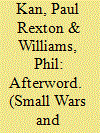

|
|
|
| 2 |
ID:
162458
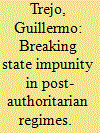

|
|
|
|
|
| Summary/Abstract |
This article claims that cross-national variation in criminal violence in new democracies is highly dependent on whether elites adopt transitional justice processes to address a repressive past. State specialists in violence who repress political dissidents under authoritarian rule often play a crucial role in the operation of criminal markets and in the production of criminal violence in democracy. Some of them defect from the state to become the armed branch of criminal organizations in their deadly fights against the state and rival groups; others remain but protect criminal organizations from positions of state power; and still others use state power to fight criminals through iron-fist policies. When post-authoritarian elites adopt transitional justice processes to expose, prosecute, and punish state specialists in violence for gross human rights violations committed during the authoritarian era, they redefine the rules of state coercion and deter members of the armed forces and the police from becoming leading actors in the production of criminal violence. Using a dataset of 76 countries that transitioned from authoritarian rule to democracy between 1974 and 2005, we show that the adoption of strong truth commissions is strongly associated with lower murder rates; we also find that the implementation of trials that result in guilty verdicts is associated with lower homicide rates only when the trials are jointly implemented with a strong truth commission. In contrast, amnesty laws appear to stimulate criminal violence. Our findings are particularly robust for Latin America and remain unchanged even after addressing selection effects via matching techniques.
|
|
|
|
|
|
|
|
|
|
|
|
|
|
|
|
| 3 |
ID:
100446
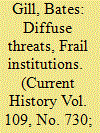

|
|
|
| 4 |
ID:
126227
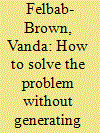

|
|
|
| 5 |
ID:
114832
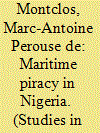

|
|
|
|
|
| Publication |
2012.
|
| Summary/Abstract |
Focused on maritime piracy in the oil-producing Niger Delta (Nigeria), this article addresses three main questions. First, how can we measure the escalation or decrease of criminal violence at sea? Secondly, what is the relationship between piracy and the (permanent) crisis of the state in Africa? Finally, what is the relationship between violence at sea and conflicts onshore? Actually, there are not enough data to monitor the real trend of maritime piracy in Nigeria. Another difficulty is that statistics and the international community focus on attacks against "big" commercial boats and the oil industry. As a result, they ignore "small" trawlers and fishermen who are the first victims of pirates in terms of homicides. Moreover, quantitative monitoring does not give details on the political economy of piracy. Too often, security analysts provide simplistic explanations that point to usual stereotypes on Africa: poverty, the failure of the state, etc. But the problem is more complex. The modernization of maritime piracy is different from a quantitative growth and has a lot to do with the local dynamics of political conflicts and crime in the oil-producing coastal states of Nigeria.
|
|
|
|
|
|
|
|
|
|
|
|
|
|
|
|
| 6 |
ID:
109921
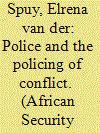

|
|
|
| 7 |
ID:
131799
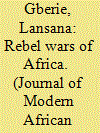

|
|
|
|
|
| Publication |
2014.
|
| Summary/Abstract |
Ispenta grim afternoon in jalluary 2008 with josllua BI2h)1', 2 nmolious facuclnal lender during Liberia': civil war. Blah},-i, also knclwn as General Bun Naked, had a few days earlier rold his mumry's South Arman-sryle TnlLh and Rccondllauon Commission (may Lhal he killed 2o.non people during Libena'> civil wan. He had started as ii buy soldier lor rlie unired Liberaucln Movement of Liberia for Dcmclcr;1cy-_[ol1nscln faction (m.IM0}J, an erllmc millria group, and Ialer fomled rile nun Naked
Brigade. 2\ band or mired eliild riglilers who believed Lhm nudily made meir b0dlt'> rrripemoue to bullets. Tm. faction iuughi iri llie verv dcsuuujvc battles of .V10nrcM'2 in April .995; claims um die group committed ritual cannibalism were widespread ar die rirrie
|
|
|
|
|
|
|
|
|
|
|
|
|
|
|
|
| 8 |
ID:
101344
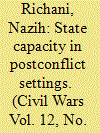

|
|
|
|
|
| Publication |
2010.
|
| Summary/Abstract |
This article proposes a systemic approach to explore the determinants of homicides. This approach examines two interrelated factors: a) the interplay between state capacities and the opportunity costs of crime; and b) consequently, the political economy of this interplay. In this article I argue that weakened state capacities in the postconflict period in El Salvador and Guatemala have helped in the creation of a systemic relationship interlocking states' agents and criminal organizations in a modality that perpetuates high rates of homicides. My purpose in this article is to discern core elements of this systemic relationship, its dynamics, and political economy and to answer: what is maintaining the system?
|
|
|
|
|
|
|
|
|
|
|
|
|
|
|
|
| 9 |
ID:
156832
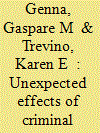

|
|
|
|
|
| Summary/Abstract |
The violence and insecurity that Mexico suffered during former President Calderon’s war on the Mexican drug cartels have come at a grave economic cost to many cities. The criminal violence had an impact on interdependent borderlands, which are geographic areas that have a symbiotic link between cities and communities of adjoining territories. Mexican business people and consumers that live in cities along the shared border with the United States have the ability to shift their economic transactions away from their insecure environments and to US border communities. In addition, US residents that would normally travel south for economic transactions would decide to avoid violent areas and therefore conduct business on the northern side. This research demonstrates that increased violence in Mexico produced a positive economic effect on the US side of the Mexico–Texas interdependent borderlands. Specifically, our time series analysis (2002–2014) shows that increased homicides, kidnappings and extortions in adjacent Mexican cities are strongly associated with higher gross total sales in the Texas communities while controlling for economic and demographic factors. We also found that the increases in the three crime categories were not associated with the arts, entertainment and recreation sector, nor the accommodation and food services sector performance. However, there was a positive relationship with the retail sales sector.
|
|
|
|
|
|
|
|
|
|
|
|
|
|
|
|
| 10 |
ID:
121466
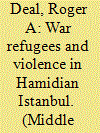

|
|
|
|
|
| Publication |
2013.
|
| Summary/Abstract |
This paper examines the place of war refugees in patterns of interpersonal violence in Istanbul in the 1890s. I argue that refugees, especially from the 1878 Russo-Turkish war, committed a disproportionate amount of criminal violence, and that their violent acts were often more extreme than those of other groups. I argue that factors such as poverty are insufficient to explain the degree of difference from the patterns of the general population. It is also necessary to look at an important cultural factor that most of these refugees share: exposure to and experience of violence. The conflicts from which the subjects of my paper were fleeing were particularly brutal ones, and thus could be expected to have a particularly brutalizing effect.
|
|
|
|
|
|
|
|
|
|
|
|
|
|
|
|